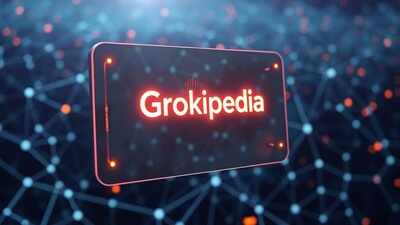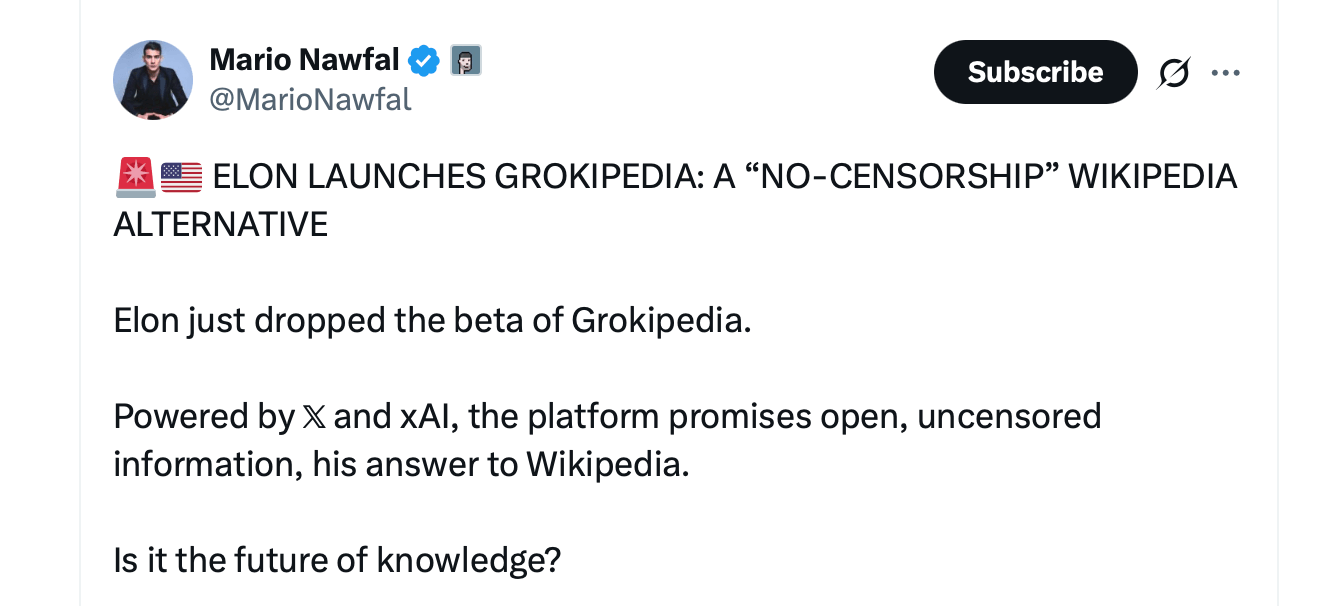Now Reading: xAI Launches Grokipedia Beta: Elon Musk’s AI-Powered Alternative to Rival Wikipedia
-
01
xAI Launches Grokipedia Beta: Elon Musk’s AI-Powered Alternative to Rival Wikipedia
xAI Launches Grokipedia Beta: Elon Musk’s AI-Powered Alternative to Rival Wikipedia

Elon Musk’s artificial intelligence company, xAI, has officially launched the beta version of Grokipedia on October 27, 2025. The AI-powered encyclopedia debuted with more than 885,000 machine-generated articles.
Elon Musk who is also among the Top 50 richest person in the world claims “surpass Wikipedia in breadth, depth, and accuracy.”
The move marks one of Musk’s boldest challenges to existing online information systems positioning Grokipedia as a “truth-driven” alternative to the crowd-edited Wikipedia, which Musk has previously criticized for bias.

According to Musk on X, Grokipedia combines the power of Grok, xAI’s large language model, with automated real-time fact-checking and transparent source links creating what he calls “a living knowledge network for humanity.”
See the tweet below:
Grokipedia will exceed Wikipedia by several orders of magnitude in breadth, depth and accuracy https://t.co/Nt4M6vqEZu
— Elon Musk (@elonmusk) October 28, 2025
How Grokipedia Works

Unlike Wikipedia’s community-based editing system, Grokipedia uses AI to write, update, and verify articles. Each entry is generated using Grok’s knowledge engine, then cross-checked against verified public data sources.
Users can’t directly edit content, but they can:
-
Report factual errors,
-
Suggest missing references, and
-
Access real-time fact-check summaries.
xAI says these reports will train future versions of Grok, improving accuracy and reducing misinformation over time.
However, early tests show that some Grokipedia articles resemble Wikipedia content reused under Creative Commons license, sparking debates about originality and AI-assisted re-publishing ethics.

READ ALSO: Top 50 Richest Persons in the World (2025)
What Makes Grokipedia Different from Wikipedia
| Feature | Wikipedia | Grokipedia (xAI) |
|---|---|---|
| Editing | Open community edits | AI-generated; user flagging only |
| Verification | Human editors and moderators | Automated real-time fact-check system |
| Sources | Cited manually | Automatically referenced with traceable links |
| Bias control | Volunteer neutrality policy | AI-driven “balance model” tuned by xAI |
| Accessibility | Fully open | Beta access, not yet open-source |
Musk’s long-term goal is to make Grokipedia open-source and immortalized, claiming that future versions will be stored “on the Moon and Mars” as part of digital-preservation projects.
Why Grokipedia Matters for the Future of AI
The launch of Grokipedia signals a paradigm shift in how information is created and distributed online. While Wikipedia relies on millions of volunteer editors, Grokipedia represents an AI-curated knowledge model where algorithms decide what’s true, relevant, and trustworthy.
For content creators, SEO strategists, and educators, this could transform how knowledge sources rank, cite, and evolve. If Grokipedia gains traction, it may soon start appearing in Google Search results, citation lists, and AI answers reshaping how facts are verified on the internet.
What’s Next for Grokipedia
xAI has outlined several future plans for Grokipedia, including:
-
Opening its API and source data for developers.
-
Launching a “verified editors” program combining AI and human input.
-
Expanding coverage beyond English to other major languages.
-
Using SpaceX’s Starlink network for planetary backup storage.
Elon Musk has hinted that version 1.0 will be “ten times better than Wikipedia.”
Whether you view Grokipedia as the future of factual knowledge or another Musk experiment, its debut highlights one undeniable truth AI is rewriting how we store and share information.
As the platform evolves, the biggest question remains: Can AI truly maintain neutrality and accuracy or will human editors still be the guardians of truth?





